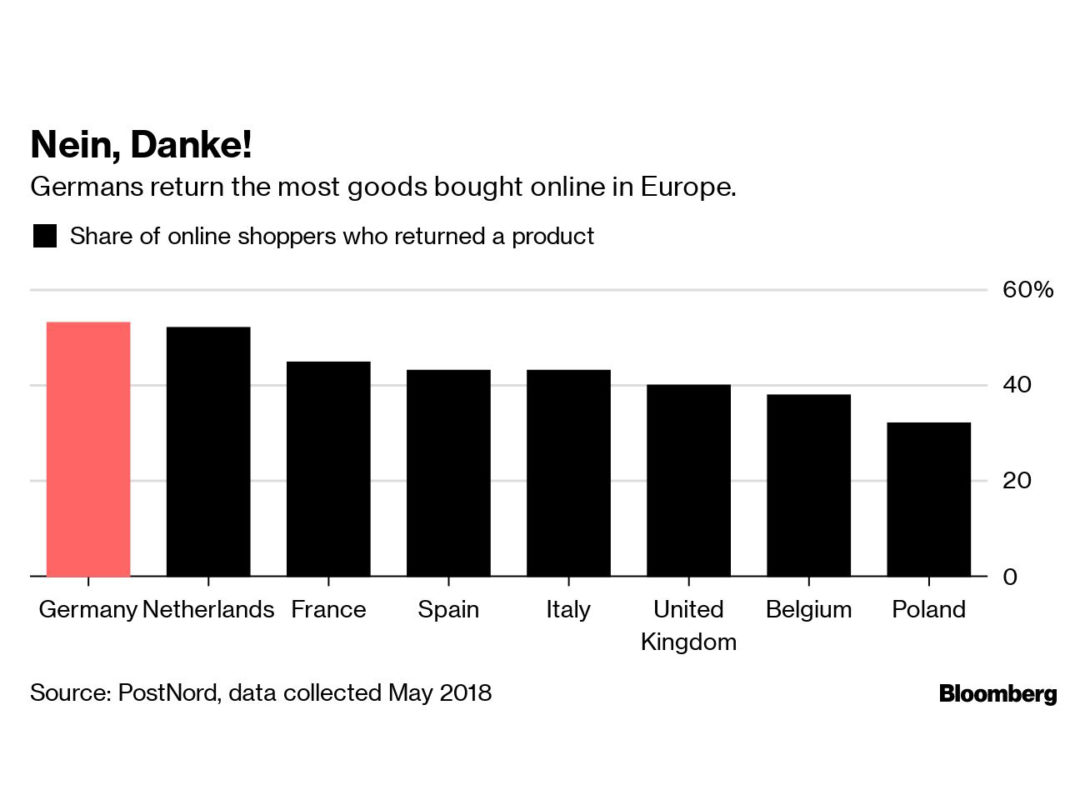
Visit Our Sponsors |
|
|
|
|
|
|
|
|
|
|
|
|
|
|
|
|
|
|
|
|
|
|
|
|
|
|
|
|
|
|
|
|
|
|
|
|
|
|

Germans were slow to embrace online shopping, but they lead the pack sending back unwanted goods. No other European country returns more packages than Germany, creating a massive financial and logistical problem for retailers including Zalando SE and Amazon.com Inc.
Online fashion retailer Zalando is trying to cut down on returns — about half its sales are sent back — by posting videos of models wearing the apparel and using machine learning technology to match shoppers with the right sizes. Mr. Spex, a German spectacle retailer backed by Goldman Sachs Group Inc., lets customers "virtually" try on glasses, placing frames over clients’ headshots as they browse its website. And Amazon has introduced augmented reality tools so that shoppers can see how a piece of furniture looks in their home before they decide to click the "buy now" button.
Creating a more efficient return system is becoming increasingly important as retailers vying for customers try to keep expenses in check. Germans returned about 5.5bn euros worth of goods last year, a study by the University of Bamberg found.
Deutsche Post AG, the German postal service, agrees that more needs to be done.
“At the moment, in terms of volumes, we're benefiting from this trend as we carry a lot of return shipments,’’ said Deutsche Post Chief Financial Officer Melanie Kreis. “We have to find more sustainable solutions to optimise the whole returns process.”
The situation in Germany, where the 10 biggest online shops account for about a third of all web sales, is particularly pronounced. Buying clothing online is popular in Europe’s largest economy, but it’s also the category that gets returned the most because many shoppers buy more than they need to try on different garments in the comfort of their own home.
Germany also has Europe’s highest rate of invoice transactions — meaning they only pay once the goods have arrived and they’ve decided what to keep. That makes it easier to abort a purchase and return the product before any money changes hands.
Companies are being forced to get creative in order to keep costs down. Amazon has threatened to charge German vendors more from October if they refuse to streamline packaging in a bid to cut waste and shipping costs. Zalando has invested in Magazino, a Munich-based robotics startup to make warehouse sorting more efficient.
Down the road, retailers will have to come up with new ways to take the pain out of returns — like offering shoppers the option of returning items in actual stores, said Lars Hofacker, an analyst at EHI Retail Institute in Cologne.
“That’s more convenient for customers and it gives the retailer an opportunity to talk to them in person, improving retention,” he said.
Sometimes, returns can even turn into a marketing asset. Nok, a Berlin startup, works with retailers to let shoppers trial select tech gadgets — for example a Krups kitchen machine — at home for 3 to 7 days after a same-day delivery in the German capital. If they don’t like it, Nok picks it up again, free of charge. Even when a product isn’t kept, shoppers will link the product with a smooth delivery and return process, said Bobby Wann, Nok’s managing director.
“You don’t always have to buy something to like a brand,” he said.
RELATED CONTENT
RELATED VIDEOS
Timely, incisive articles delivered directly to your inbox.






